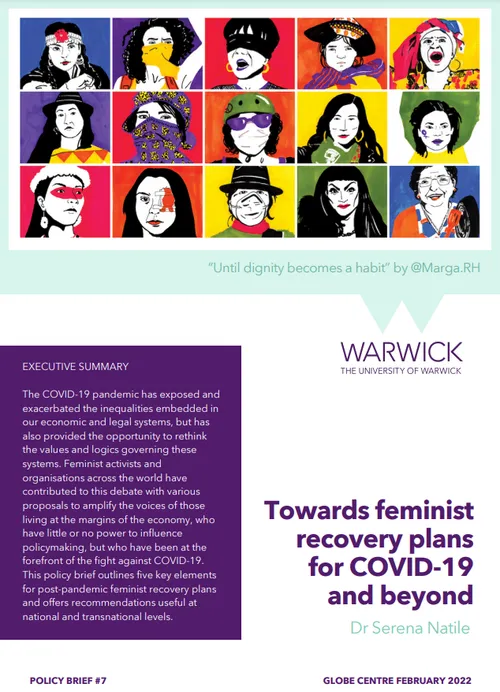Warwick Law School News
Warwick Law School News
The latest updates from our department
GLOBE Policy Brief on Feminist Recovery Plans for COVID-19 and Beyond
The seventh in a series of briefs, bringing current legal thinking to bear on public policy issues and contemporary concerns, has now been published by GLOBE, a research centre within Warwick Law School.
Towards feminist recovery plans for COVID-19 and beyond by Dr Serena Natile, Assistant Professor at Warwick Law School, explores how the COVID-19 pandemic has exposed and exacerbated the inequalities embedded in our economic and legal systems, and argues for the need to rethink the values and logics governing these systems. The brief is based on research insights and policy interventions advanced by feminist activists and organisations with the purpose to amplify the voices of those living at the margins of the economy, who have little or no power to influence policymaking, but who have been at the forefront of the fight against COVID-19. The policy brief outlines five key elements for post-pandemic feminist recovery plans and offers recommendations useful at national and transnational levels.

The policy brief is based on Serena’s current ‘Feminist Recovery Plan’ research project which aims to bring together activists, academics and policy-makers to collectively reimagine feminist recovery plans for Covid-19 and beyond by placing grassroots feminisms at the centre of policy-making, learning from the past and looking at the future. Besides GLOBE, this project also involves two other research centres at Warwick: the Warwick Centre for the Study of Women and Gender (CSWG) and the Warwick Interdisciplinary Centre for International Development (WICID) Find out more about the project.
The policy brief makes four key policy recommendations:
- Advocate for an international minimum wage (combined with maximum wage and taxation of wealth) that would protect workers in different global value chains (from workers in commodity chains and in the gig economy to domestic and sex workers) and an unconditional basic income to all people, regardless of employment and migration status to ensure the protection of their dignity as humans. Unpaid work, including care and community labour, should also be recognised and rewarded.
- Address social injustice in access to basic services such as food, housing, sanitation, healthcare, education, childcare, eldercare, disability-care through public social provisioning.
- Refocus rules of international economic and financial law to ensure a decent standard of living for all people instead of profit and accumulation.
- Implement reparative measures, such as debt cancellation and land restitution, as well as binding redistributive measures around labour, social welfare, access to technology, environmental and economic justice – recognising the collective nature and consequent rightful share of global wealth.
The aim of the GLOBE policy brief series is to improve the factual base on which policy decisions are made and share cutting-edge academic research in an accessible and relevant manner with policymakers, the media, civil society groups and the general public.
Download Towards feminist recovery plans for COVID-19 and beyond by Dr Serena Natile: https://warwick.ac.uk/fac/soc/law/research/centres/globe/policybriefs/pb7_towards_feminist_recovery_plans_for_covid19_and_beyond_-_serena_natile_feb22.pdf
For more information on the policy series or to read previous briefs visit: go.warwick.ac.uk/globe/policybriefs
NOTES
The Centre for Law, Regulation and Governance of the Global Economy (GLOBE) at Warwick Law School, created in 2014, is a research and public engagement centre that brings together staff and postgraduate students working in international economic law, business and commercial law, corporate governance and financial regulation.
